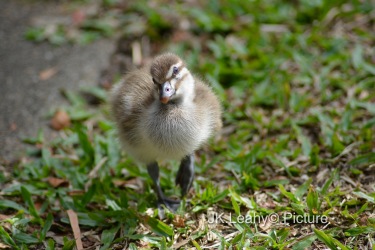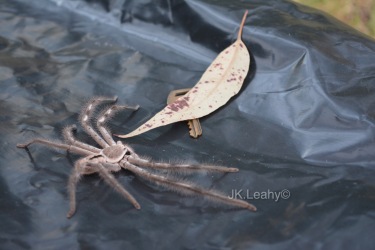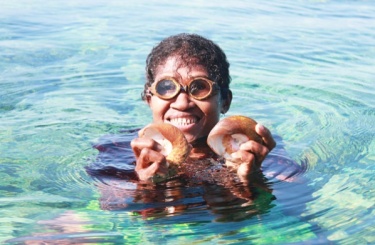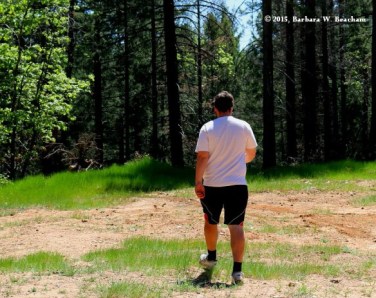
Life has not been dull since Penelope was born. Penelope is a goddess, because she deserves to be treated like one and she is named after a real goddess. Penelope eats grasshoppers like she has been starving for days. Because she is little, she often does not move quick enough to catch all the grasshoppers she finds. She does catch a few; I like to help with the small fish tank scoop. This duckling was almost three weeks old in this picture.
We think this Penelope may be the grand baby of our pet duck Princess. She was admiring her new bed made of a broken ceramic pot with leaves form the South African cherry bush in our backyard in the above picture. It has been two weeks since I started her story and now, she is too tall for the pot and has been given a new bed of coconut husk fibres in another pot. Although she likes the coconut fibres, Penelope prefers to be covered when sleeping with a very soft pink cotton scarf (see in picture below).
I thought Penelope (meaning ‘duck’) after Penelope of the Greek mythology, the daughter of Prince Icarius of Sparta and the nymph Periboea seemed an appropriate name for this duckling because she is one tough duck. The story of the Greek Penelope was that she waited for 20 years for Odysseus to return from war. When she was born her father, who had wanted a son, found out her mother had her and threw her into the river where ducks eventually rescued and raised her. The truth is, the duckling could be a male and we don’t know yet. If ‘she’ turns out to be a male duckling, that would be funny. We might have to name her after Penelope’s love, Odysseus, to play along with the theme.

Our little goddess Penelope lost her five siblings and parents late one night when she was left alone in the pool. I alerted my son Nathan when I heard her crying. It was cold and dark and she was nothing but uncooperative. She eluded us for close to half an hour, swimming and diving in the icy, pitch black water. At that time we guessed she was only a week old.
She would only pop out of the water for seconds and barely give enough time to spot her before vanishing again, bubbles and ripples of water indicating where she was popping up next. Penelope was obviously terrified, but very clever in escaping. After Nathan and I eventually decided to split our rescue efforts I scooped her out of the water by blocking her escape on the pool steps with cardboard. Really – we just got lucky.
In its first week in our care, Penelope was brave and quiet. She did not cry loudly like previous ducklings, including Princess that we had cared for. Her mother showed up a few times and it became very emotional but she took to the routine of feeds, baths and walks and then music on the radio and bedtime. She loved cuddles and enjoyed crawling into fresh washing and soft clothing to have a sleep.
While bathing one Saturday morning, Penelope became quiet. Not hearing splashes, I went out to check her and found her floating with her white belly up – like a balloon. Distraught with guilt and panic, I pulled her tiny body out of the water and yelled at my sons while I panicked. How was I meant to give first aid to a tiny duckling? I did not know how to give first aid to a human, I had seen it done. I called Nathan – hoping he learnt something about saving animals at university. Nathan was intending on becoming a doctor – so my hopes for Penelope was pinned on him.
“Mum…really?” was all Nathan said, distress and frustration wrinkling his features.
I began to cry and laid Penelope’s body on the warm concrete in the open sun and pressing on her as Nathan suggested while I cried. I opened her little beak and could not fit my pinky down her throat which was so tiny. Nathan tried to dry her and kept telling me she was still breathing. All I could see was a round swollen white furry ball with four black sticks sticking to it, that was poor Penelope’s little body.
Drowning was not something you expect of a duck, but she is still a baby. Baby ducklings also lose their body heat very easily. I have seen a few duckling down in the past.
Her beak parted and moved and then opened, and her heart still pumped. It was a good half hour before she moved and an hour before she opened her eyes. Her milky second eyelids had stretched over her eyes for a long while. Three hours later from her warm towel, she made a sound that was not a duckling sound, but rather a recording played by a cheap, submerged speaker. By the end of the day, her feathers dried out and she finally stood on her feet. It was a very happy moment for our family. She did not eat or drink until nightfall and she drank some water. The next day, she woke up, after hours of sleep and was fighting fit.
She became ill with fever soon after and stayed in bed for the rest of the day. That same afternoon, she gained some strength and wanted to walk so I took her outside, into the backyard. To my surprise, she tried to catch the grasshoppers, so I helped. We caught and (she) ate seven grasshoppers. Some she could not swallow; they were even larger than her beak, but she ate them all.
Penelope also loves lettuce and dandelion seeds with the duck mesh. Since she nearly drowned, she refuses to dive into the water and only splashes water on her back when she bathes. After each wash, she looks at you for a towel dry before grooming herself.

A week ago, she managed to twist her leg. I found her dragging herself along when I put her outside to play. Again, she was nursed, bathed, fed and cuddled until her sprained foot and leg looked better about 5 days later. In the first three days, we packed her foot and leg with wrapped ice-cubes. She is all good now!
Penelope likes you to scratch her head – and if you don’t she pecks your hand delicately to remind you. She loves the radio music on while she is sleeping during the day and would not sleep in wet or soggy pooped beds. At night, she wants to be totally covered and tucked in and demands total silence.
The Myth about Penelope
The wife of the hero Odysseus* in Greek mythology, Penelope, was celebrated for her faithfulness, patience, and feminine virtue. For the 20 years that her husband was away during and after the Trojan War, Penelope remained true to him and helped prevent his kingdom from falling into other hands.
Penelope’s parents were Prince Icarius of Sparta and the nymph Periboea. Periboea hid her infant daughter as soon as she was born, knowing that Icarius had wanted a son. As soon as Icarius discovered the baby girl, he threw her into the sea to drown. However, a family of ducks rescued her. Seeing this as an omen, Icarius named the child Penelope (after the Greek word for “duck”) and raised her as his favorite child.
When Penelope reached womanhood, Odysseus asked for her hand in marriage. Although reluctant to part with his daughter, Icarius agreed, and Penelope went with her new husband to his home on the island of Ithaca. Penelope and Odysseus were deeply in love, so it was with great sorrow that Odysseus later left her and their infant son, Telemachus, to fight in the Trojan War.
The Trojan War lasted ten years, and it took Odysseus another ten years to get home to Ithaca. During that time, Penelope received the attentions of many suitors. For a while, she put them off by saying that she would consider marriage only after she finished weaving a shroud for her father-in-law, Laertes, who was grieving over Odysseus’s absence. Each day Penelope would sit weaving the cloth, but at night she would secretly unravel her work. After three years, a servant revealed Penelope’s secret, and she had to finish the shroud. When her suitors became insistent again, Penelope announced that she would marry the man who could shoot an arrow through the loops on a row of 12 ax heads.
Other wild duck stories on this blog are:
Saved Duck Returns with Babies






















